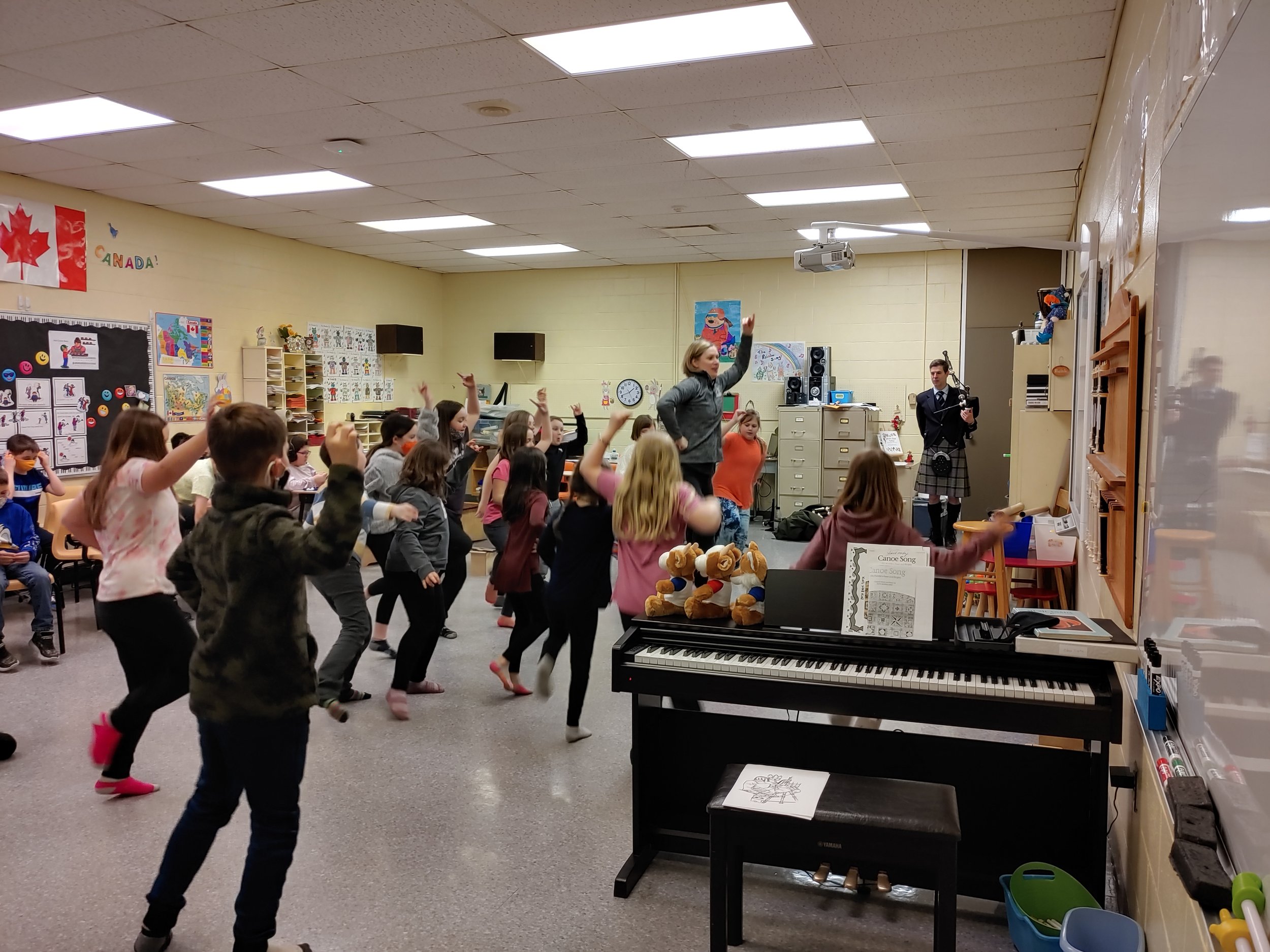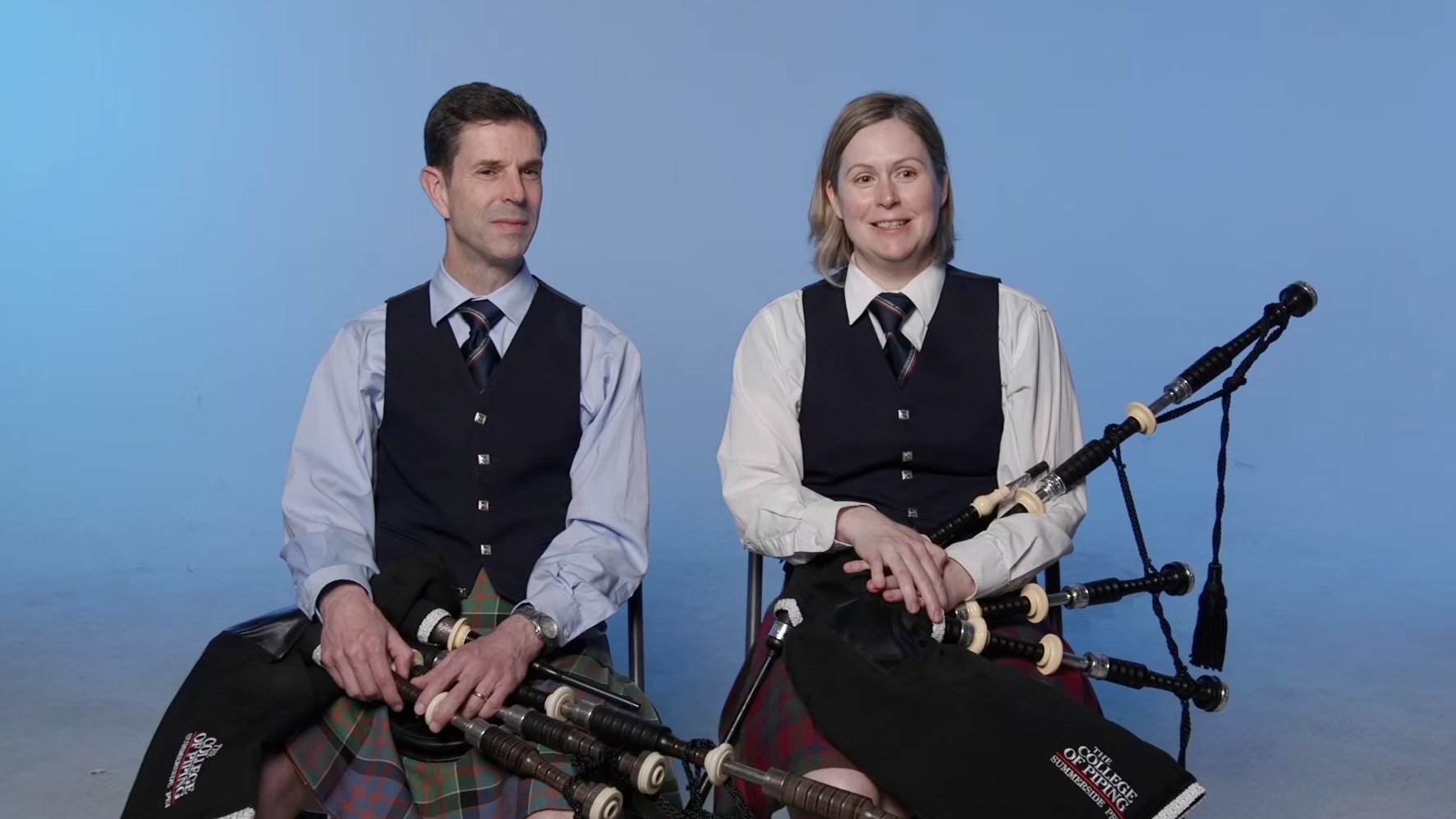Scottish Highland Bagpipes and Fling with James and Kylie MacHattie
The Basics
James and Kylie MacHattie are both bagpipe instructors with the College of Piping and Celtic Performing Arts of Canada in Summerside, PEI. James and Kylie both play the Scottish Highland Bagpipes. In these videos, James and Kylie perform different examples of bagpipe tunes, share an example of Highland Fling dance, teach us some basic dance steps and invite us to take a closer look at the bagpipes and the traditional clothing they are wearing.
The piece James performs for us is called “Orange and Blue,” and it’s a strathspey. Strathspeys are in simple time, have four beats in the bar and are at a slower pace than the livelier jigs and reels dance tunes. Strathspeys can also feature a rhythm called the “Scotch Snap,” which is when a short, accented note is followed by a longer one.
Kylie performs “Scotland the Brave,” which is a march. Marches were originally composed for marching to and have two or four beats to the bar and a strong steady pulse.
The dance that Kylie teaches is called the Highland Fling, which was originally a “war dance” and is sometimes danced over a sword! In these videos she performs it to “Orange and Blue,” played by James.
James and Kylie provided the following background information & introduction to the Highland Bagpipes:
The Great Highland Bagpipe is the national instrument of Scotland. Bagpipes in various forms have been around for thousands of years, but we know that the Great Highland Bagpipe was actively being played and taught in Scotland 700 years ago. We still have music that was written then and is still played today.
In the 1400s, the MacCrimmon family started a school of piping on the Island of Skye in Scotland. Today, there is a College of Piping in Summerside, PEI, still dedicated to teaching kids and grown ups to play bagpipes. James and Kylie, who are working on this project, teach piping there, and can trace the lineage of their instructors back 700 years to the MacCrimmon family.
Bagpipes used to be played by themselves, but in the 1800s pipe bands (bagpipes and drums) started in the British military. The bagpipes had been considered to be an instrument of war, since the Scottish clans would charge against their English opponents to the music of bagpipes. But really, bagpipes were used for social occasions mostly. The English people recognized the power of bagpipes in making people feel very strong emotions, and added pipe bands to their military regiments when Scotland and England were united.
At one point, when Scotland and England were still fighting, bagpipes became outlawed. It was illegal to play bagpipes! It was also illegal to wear the kilt, which is another emblem of Scotland. They are similar to skirts, but were considered very "manly". They are colourful, made of tartan material, and tartans represent clans, or families.
Bagpipers play traditional Scottish music: marches, strathspeys, reels, jigs, hornpipes, airs, and piobaireachd (PEE-brock).
Bagpipes have five tubes, four reeds, and a bag. The piper blows up the bag through the blowpipe, and then alternating blowing and squeezing at high pressure, the other four pipes make music when tuned properly. The three tubes over the shoulder are drones, and they play a low hum. The fingers go on the chanter, where the melody comes from. The reed in the chanter is a double reed, like an oboe or a bassoon. There are all sorts of tricky fingerings that pipers use to separate notes since we cannot use our tongues and we play continuous.
Bagpipes can be performed in many places, but the most common are parades, concert halls, and in competition. In competition we usually play outside, in either sun or rain. We travel all over the place, and definitely Scotland. The College of Piping Pipe Bands compete at the World Championships every few years, and our Grade 4 band won the World Championships in their grade in 2017!

Extension Activities
The “Skye Boat Song” is a very well-known Scottish tune that is sometimes played on the bagpipes. Watch a bagpipe video, learn and sing this song together, play on recorder, or even learn the chords on the ukulele.
Scottish tunes are played in a variety of different time signatures and with different rhythms. Listen to different examples of Scottish bagpipe tunes while moving, keeping the beat, or playing along to reinforce concepts of tempo, metre, and time signatures. More resources for exploring Scottish music can be found on the Oliver’s Song website.

About James and Kylie
About James
James began piping in a youth pipe band in Saskatoon, Saskatchewan, and the formative experiences he enjoyed there have carried him to become one of Canada’s most respected active pipers. He played with the Edmonton Caledonia (now Alberta Caledonia) Pipe Band before moving to BC, where he played one year with the City of Victoria Pipe Band before joining the Simon Fraser University Pipe Band. With SFU he won the World Pipe Band Championship in 1996 and 1999, performed at Carnegie Hall and participated in two live recordings. In 2000 he moved to Toronto, and joined the Toronto Police Pipe Band. In 2004 he became the Pipe Major and led the band to North American Championship wins in 2004 and 2006. He played with the 78th Fraser Highlanders from 2007 to 2009 before moving back to BC. He played the 2010 season with SFU before moving to Summerside.
James has enjoyed a successful career as a solo competitor, having won major prizes across Canada, the US, Scotland and France. He is a consistent prize winner in the Gold Medal contests at Oban and Inverness.
He is an active composer, judge, performer and teacher, having taught at schools across Canada. One of his proudest achievements in his piping career was working with the Robert Malcolm Memorial (Juvenile) Pipe Band from 1998 to 1999, culminating in the kids winning both the Juvenile World Pipe Band and Cowal Championships.
James holds an MA in Classical Studies from the University of British Columbia. He has worked in disparate areas, ranging from lecturing at the University of Toronto, to developing and producing business conferences, to working for the 2010 Vancouver Olympics.
About Kylie
Kylie has been a full time piping instructor at The College of Piping and Celtic Performing Arts of Canada since 2010.
Kylie has been piping since the age of 7, and has been a member of Grade One bands since her mid teens. She played with the Vancouver Ladies, Triumph Street and Abbotsford Police pipe bands in BC before moving to Ontario in 2000. There she spent 6 seasons with the Toronto Police Pipe Band and three with the 78th Fraser Highlanders. In this time she was a member of the North American Championship winning grade one pipe band on 5 occasions. Kylie was a member of the Simon Fraser University Pipe Band in 2010. She is an accomplished professional solo competitor.
She is currently the Pipe Major of the College’s Grade 3 pipe band. In 2017 she was the Pipe Major when the band won the World Championships in 4B at the World Pipe Band Championships in Glasgow, Scotland. Kylie holds a BA (Honours) in English from York University.

